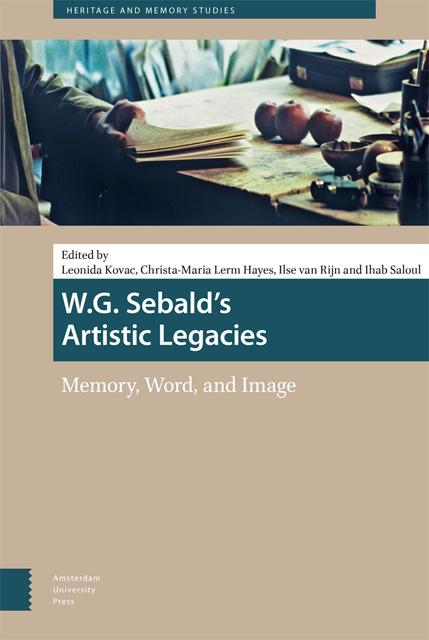8 - Working with Images: Documentary Photography in the Oeuvres of Mike Kelley and W.G. Sebald
Published online by Cambridge University Press: 26 October 2023
Summary
Abstract
Departing from W.G. Sebald’s use of photographic images in Austerlitz (2001) and other writing to reflect on memory and history, this text examines artist Mike Kelley’s use of photography in relation to the reconstruction of memories and the fictional. Kelley’s and Sebald’s practices are here compared in their respective uses of found and repurposed photographs to highlight their play with arbitrary boundaries between the real and imagined. The focus is on Kelley’s monumental work Extracurricular Activity Projective Reconstruction (A Domestic Scene) (2000), which particularly resonates with Sebald’s themes. The American artist was born in 1954, ten years after Sebald, and like the German writer grew up in a Catholic working-class family. While their similarities are striking, beyond this their backgrounds differ greatly. In closing, the text seeks to pinpoint what kind of a contribution to memory studies the imagined dialogue between the word and image practices of Sebald and Kelley could make.
Keywords: Reconstruction, Spiritualistic, Utopian, Performance, Historical and Projective Authenticity
In the twentieth century, memory was the subject of debate and change in the fields of art, philosophy, and science. A remarkable turning point came about with the misconception surrounding memory as an objective reconstruction of the past, reformulated through the theoretical model of the “false memory syndrome.” This was especially prominent in the 1980s, when personal memory recovery in psychotherapy was found to be potentially misleading or inaccurate, along with a set of parameters in collective memory that presented the history as the only true story that was possible. Shifts between the past as the paradigm of memory, from History to histories, from memory to memories, became central of the view of postmodernism as the “death of centers” and “incredulity towards metanarratives.” Modernity led to the questioning of the past that never remains stable and the same, but is constantly reconstructed by individual forms of collectivity (family, institution, nation). As Andreas Huyssen has observed: “in literature, the old dichotomy between history and fiction no longer holds. Not in the sense that there is no difference, but on the contrary in the sense that historical fiction can give us a hold on the world, on the real, however fictional that hold may turn out to be.”
- Type
- Chapter
- Information
- W. G. Sebald's Artistic LegaciesMemory, Word, and Image, pp. 151 - 166Publisher: Amsterdam University PressPrint publication year: 2023



